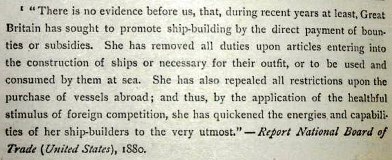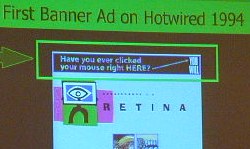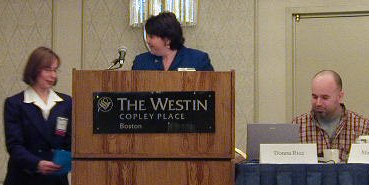danbricklin.com/log
|
||
|
|
Starting May 30, 2000
The judge's decision, Government help, Zeff Group's Advertising & Marketing on the Internet conference
30May00-8Jun00
2000_05_30.htm
|
|
Thursday, June 8, 2000
The judge's decision
Everybody and their brother are being asked for comments about breaking up Microsoft. Here are my quick two cents:
Monday, June 5, 2000
Government help
I ran across an old book someone at work brought in that had belonged to his great-grandfather. It was "Our Merchant Marine: How it rose, increased, became great, declined and decayed" by David A. Wells, printed in 1885. Below the original owner's name was a handwritten date:
It's strange seeing "86" and knowing the author thought the century was redundant -- "18" that is. When I first saw it, of course, my eye read "1986" -- not so old. I needed the title page to find out for real. Handwriting in ink from 119 years ago looks just like it does today. Magnetic media from 119 weeks ago often looks old fashioned and may be unreadable on today's new equipment. (Have any 5 1/4" floppies? Bernoulli disks?)
A quick thumbing through the book got me this footnote, retyped below:
 "There is no evidence before us, that, during recent years at least, Great Britain has sought to promote ship-building by the direct payment of bounties or subsidies. She has removed all duties upon articles entering into the construction of ships or necessary for their outfit, or to be used and consumed by them at sea. She has also repealed all restrictions upon the purchase of vessels abroad; and thus, by the application of the helpful stimulus of foreign competition, she has quickened the energies and capabilities of her ship-builders to the very utmost."
- Report National Board of Trade (United States), 1880.
Rule Britannia! Britannia ruled the waves! Tax policies were used to help them become (and stay) an international power, I guess. Sound anything like our policy 120 years later in the USA to keep taxes out of Internet stuff so it can develop? How about using foreign competition to keep the folks at home on their toes? This old mention is another reminder to those who think government should always stay out of things since they don't help. (The real question is how best to be involved...) How important was naval superiority to the British? How important will Internet superiority be to the USA? Rule Internet Protocol! IP rules the bits!
Tuesday, May 30, 2000
Zeff Group's Advertising & Marketing on the Internet conference
Last week I attended the Boston edition of the Zeff Group's Advertising & Marketing on the Internet conference at the Westin Hotel in downtown Boston. I had three special reasons to go. First, I attended last year and enjoyed it. Second, one of my co-workers at Trellix, Matt Malloy, was speaking. And third, Robbin Zeff (the head of the Zeff Group) is my cousin (her mom and my dad are siblings), and I love watching a cousin being a professional and making us other cousins proud. When we were children she was one of the youngest cousins and I was one of the oldest. Now we're peers, asking each other for advice. The changes in life can be fun.
  Me and my cousin Robbin Zeff, Robbin being a professional up on stage
The conferences are usually sponsored by local Internet media and affiliates. People in the day to day business of Internet advertising and marketing speak, with lots of case studies, and there is structured time for networking. It's a nice introduction for those new to the business, and we at Trellix send a few people each year to the one in Boston.
I only stayed for the morning. Here are some of my notes:
From Robbin's opening:
 First banner ad: "Have you ever clicked your mouse right HERE? YOU WILL"
After Robbin there was a panel. The first couple of speakers gave histories of their web sites (ZDNet and CTnow.com). CTnow.com, a newspaper spinoff web site for Connecticut, finally carried ads after it was in operation for 3 years: "You'd be amazed how excited the publisher gets over a $2000 banner ad."
Evan Grossman of HookMedia said you must check your Internet ad campaigns daily. What worked last week may not work this week. It's the reverse of TV. On TV, an ad rarely has any effect until you've seen it 3 times. On the web, clickthough drops after you've seen an ad once or twice and then the creative needs to be refreshed. What's working today: non-traditional sizes, email sponsorships which are great for messages that need 40 words of text. You look at a URL during a web radio broadcast but not while driving in your car -- advertise at the right place at the right time.
Then came Matt, director of Internet Marketing at Trellix. He gave a case study: Using banner ads to get people to download a 16MB program (our PC tool, Trellix Web). His goals included at least a 1% clickthrough rate, not lose too much money, and SAMFU (Show All My Friends Up who don't believe in banner ads). You must have numbers to gauge success, he said. The first try, using an outside agency, was over-designed and the results were "stinky" -- $30-80 to get one download of a free product. No SAMFU -- he was eating crow. After 3-4 months of innovation, iteration, measuring, trying again and again (a common theme from all the presenters) and in-house innovation, they found something that works great.
 Robbin, Donna Rice of Boston.com, and Matt Malloy of Trellix get ready for the panel session
He then showed in detail the banners and explained why they worked. "I can't believe I'm showing what works," he exclaimed, but then reassured himself with "...but the Internet changes so fast it won't work in a few months." He explained, among other things, how they tuned the visuals to be noticed, made the banners load fast (if the average person only stays on a page for 17 seconds you can't have an ad that takes 15 seconds to load and 5 seconds to read), and made the message simple ("Click here to get a free web site: Yes or No"). It became clear that readers feel "don't trick me with marketing" -- simpler pages worked better. (Another test that proves some of Jakob Nielsen's points.) Through in-house work they did 50-100 revisions. "Refinement, refinement, refinement. It's all about refinement." Finally, they're getting 2-7% clickthroughs and the cost of attracting a download is getting very low. He's the one smiling now.
Great speech with great delivery. I was very proud that he represented Trellix.
The last speaker of the panel was a lawyer and another good speaker. What I took away from his talk was that the climate is changing very fast, and that you have to be very, very careful about any information you are keeping about people, even if it's only leaving cookies behind on their PC. Be very up front and post what your polices are and follow them. The government is looking at privacy very carefully and other lawyers are looking for suits to bring. Watch out. It was a very scary speech.
A few more speakers, then lunch, then I left to get back to work for some meetings.
One of the handouts: a copy of Robbin's book, Advertising on the Internet (Second Edition), which she wrote with Brad Aronson and which is published by John Wiley & Sons. It's a complete primer on on-line advertising including using the web and email. (Here's a link to it on Amazon.com if you want to buy it and give me credit or learn more by reading the reviews.)
|
||
|
© Copyright 1999-2018 by Daniel Bricklin
All Rights Reserved.
|
||